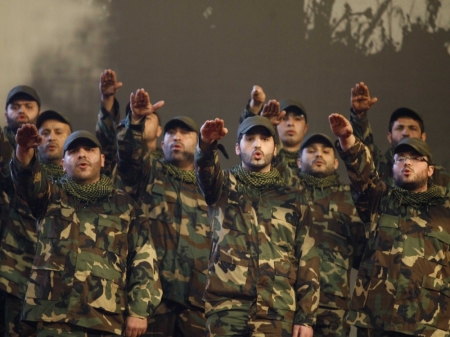'They Accept Us as We Are;' Christians Join Forces With Muslim Group Hezbollah to Fight ISIS in Lebanon

The Iran-backed Shiite Muslim militant group Hezbollah, classified for many years by U.S. Intelligence as a terrorist organization, is training Christians to fight ISIS in Lebanon and the Middle Eastern believers say their new and unlikely allies "accept us as we are."
Citing Lebanese sources, Joseph Farah's G2 Bulletin says Christian villages in the Bekaa Valley area of Lebanon are forming militias to join Hezbollah fighters already engaging ISIS and the al-Qaeda-affiliated Jabhat al-Nursa Front in the Syrian Qalamoun mountains opposite villages in central and eastern Bekaa.
Rifit Nasrallah, a Catholic businessman who is part of the militias fighting ISIS in Ras Baalbek, discussed the alliance with Hezbollah in an International Business Times report last month.
"We're in a very dangerous situation," he said. "The only people who are protecting us are the resistance of Hezbollah. The only one standing with the army is Hezbollah. Let's not hide it anymore."
Nasrallah said Hezbollah does not expect its allies to convert to Islam or create an allegiance to the group's ideals.
"They accept us as we are," he said. "They do not impose on us anything. When there's an occasion, they come to our children's birthdays. The people here accept that Hezbollah comes and helps."
This unlikely alliance between Christians and Hezbollah is a far cry from the adversarial relationship depicted between the two groups in the region.
According to the IB Times report, however, the alliance is one of convenience. Hezbollah is Iran's strongest proxy in that area of Lebanon and has been a key factor in keeping President Bashar Assad's regime in power after four years of the Syrian war. Protecting Ras Baalbek is a priority for the group because losing it to ISIS would put the surrounding Shiite towns under direct threat.
As a result, Hezbollah has invested heavily in sustaining the relationship with Christians. The group trained Christians in Syria to fight ISIS alongside them, according to a November report from Lebanese newspaper An-Nahar and even paid wages similar to Hezbollah members for Christians joining their ranks.
"We are not speaking of an assumed threat, we are speaking of a real aggression that exists every hour, every day, every night," said Hezbollah Secretary-General Hassan Nasrallah in a recent speech. He explained that armed groups have launched continuous attacks inside Lebanese territories while also holding dozens of Lebanese soldiers and police officers hostage, "so we need a permanent solution."
Last fall, The Christian Post reported that GOP 2016 presidential candidate, Sen. Ted Cruz, R-Texas, was booed after he offended some Middle Eastern Christians by declaring at an event in Washington, D.C. that "Christians have no greater ally than Israel."
Mark Tooley, president of the Institute of Religion and Democracy and an attendee at the evening event, later wrote in a blog entry that he was not surprised by the reaction.
"It's no secret that many Mideast Christians generally aren't big fans of Israel. I learned this firsthand during the 2006 Israel war on Hezbollah, when my discussion at church with a Lebanese Christian nearly escalated to a shouting match," wrote Tooley.
"Sometimes American Christians romanticize overseas persecuted Christians into disembodied noble souls unaffected by terrestrial concerns. But they, like everybody else, have histories, loyalties, resentments, grievances, and political calculations."
The Times of Israel reported in March that Iran and Hezbollah were removed from the list of terror threats against the U.S. as a result of its campaign against ISIS.
"We believe that this results from a combination of diplomatic interests (the United States' talks with Iran about a nuclear deal) with the idea that Iran could assist in the battle against the Islamic State in Syria and Iraq and maybe even in the battle against jihadist terrorism in other countries," the Meir Amit Intelligence and Terrorism Information Center said in an analysis of the unclassified version of the Worldwide Threat Assessment of the U.S. Intelligence Communities released in February.
Another American body, the Defense Intelligence Agency, however, said both Iran and Hezbollah were still terrorism threats.
"Islamic Revolutionary Guard Corps-Qods Force (IRGC-QF) and Lebanese Hezbollah are instruments of Iran's foreign policy and its ability to project power in Iraq, Syria, and beyond," noted the body in their assessment, submitted to the U.S. Senate on Feb. 26.
"Hezbollah continues to support the Syrian regime, pro-regime militants and Iraqi Shiite militants in Syria. Hezbollah trainers and advisors in Iraq assist Iranian and Iraqi Shiite militias fighting Sunni extremists there. Select Iraqi Shiite militant groups also warned of their willingness to fight U.S. forces returning to Iraq," it noted.





















